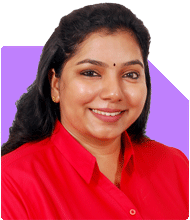How to Manage Finances with Monthly Expenses, EMI, and Future Investment Goals?
Ramalingam Kalirajan |8260 Answers |Ask -Follow
Mutual Funds, Financial Planning Expert - Answered on Jul 26, 2024
He has an MBA in finance from the University of Madras and is a certified financial planner.
He is the director and chief financial planner at Holistic Investment, a Chennai-based firm that offers financial planning and wealth management advice.... more

rediff.com Rediff Gurus Logo Hi Pankaj Sharma | Sign Out HealthHealth MoneyMoney RelationshipRelationship CareesCareer Ask your questions about health, money, relationship or careers here Ask Anonymously You posted: Hi Ramalingam Sir, Hope you doing great and healthy. Sir, I am 34 year old and having 2 daughter 7 year old and 6 months old. My house hold (me and spouse) income is 1 lakh 30k in hand. My monthly expenses are around 35000 and school expenses are 20000 quarterly. I have monthly EMI of 50000 which will be ending on July-25. I have a land worth 31 lakh, and investing 5k monthly in PPF. I have term insurance of 1cr. I want to plan my financial in systematic way. I have surplus of 10k more monthly which I have to invest, please suggest any Mutual Fund in 60% equity and 40% debt. I have a future goal in 2026 of building my own home on land I purchased with construction loan. Also I want to build some corpus for both daughters education. Please help me how I can plan to meet a good financial life.
You have a stable household income of Rs. 1,30,000 per month. Your monthly expenses are Rs. 35,000, with quarterly school expenses of Rs. 20,000. You have a significant EMI of Rs. 50,000, which will end in July 2025. You invest Rs. 5,000 in PPF monthly and have a term insurance of Rs. 1 crore. You own land worth Rs. 31 lakhs and have an additional Rs. 10,000 monthly for investment.
Financial Goals
Build a home on your land by 2026.
Create a corpus for your daughters' education.
Systematically invest the surplus Rs. 10,000.
Expense Management
Your expenses are well-managed, but optimizing them can provide more room for savings. Review your expenses periodically and adjust where possible. Consider small lifestyle changes that can help reduce costs without impacting your quality of life.
Investment Strategy
Public Provident Fund (PPF)
You are already investing in PPF, which is a good long-term, tax-saving investment. Continue this as it provides a secure and tax-efficient growth for your funds.
Mutual Funds: Equity and Debt Allocation
For your surplus Rs. 10,000, investing in a balanced mutual fund with a 60% equity and 40% debt allocation is wise. This provides growth potential with moderate risk.
Equity Component (60%):
Invest in diversified equity mutual funds.
Focus on funds with a track record of consistent performance.
This portion will help in wealth creation over the long term.
Debt Component (40%):
Invest in debt mutual funds for stability and regular income.
These funds have lower risk and provide steady returns.
They will balance the volatility of the equity portion.
Home Construction Goal
You aim to build a home by 2026. Start planning for the construction loan early. Ensure you have a clear budget and timeline. Keep a portion of your savings in liquid assets for this purpose, so you can access funds quickly when needed.
Children's Education Fund
To build a corpus for your daughters' education, start a dedicated investment plan.
Systematic Investment Plans (SIPs):
Allocate a portion of your surplus to equity mutual funds via SIPs.
SIPs provide the benefit of rupee cost averaging and disciplined investing.
Consider child-specific mutual funds with a mix of equity and debt.
Insurance Coverage
Your term insurance of Rs. 1 crore is a good safety net. Review your insurance needs periodically to ensure it covers your growing responsibilities.
Emergency Fund
Maintain an emergency fund to cover at least 6 months of your household expenses. This fund should be easily accessible and kept in a savings account or liquid fund.
Regular Monitoring and Review
Track Your Investments:
Regularly review your investment portfolio.
Ensure your investments align with your financial goals.
Financial Health Check:
Conduct an annual financial health check.
Adjust your investments based on market conditions and personal circumstances.
Tax Planning
Leverage tax-saving instruments like PPF, ELSS (Equity Linked Savings Scheme), and National Pension System (NPS) to reduce your taxable income. Proper tax planning can enhance your savings and investments.
Final Insights
Your financial foundation is strong. By strategically investing your surplus and planning for future goals, you can achieve financial security and growth. Regularly monitor and adjust your plan to stay on track.
Best Regards,
K. Ramalingam, MBA, CFP,
Chief Financial Planner,
www.holisticinvestment.in
You may like to see similar questions and answers below
Ramalingam Kalirajan |8260 Answers |Ask -Follow
Mutual Funds, Financial Planning Expert - Answered on Jun 04, 2024
Ramalingam Kalirajan |8260 Answers |Ask -Follow
Mutual Funds, Financial Planning Expert - Answered on Jun 21, 2024
Ramalingam Kalirajan |8260 Answers |Ask -Follow
Mutual Funds, Financial Planning Expert - Answered on Jul 26, 2024
Ramalingam Kalirajan |8260 Answers |Ask -Follow
Mutual Funds, Financial Planning Expert - Answered on Jan 31, 2025
Dr Nagarajan Jsk |323 Answers |Ask -Follow
NEET, Medical, Pharmacy Careers - Answered on Apr 18, 2025
Radheshyam Zanwar |1535 Answers |Ask -Follow
MHT-CET, IIT-JEE, NEET-UG Expert - Answered on Apr 18, 2025
Radheshyam Zanwar |1535 Answers |Ask -Follow
MHT-CET, IIT-JEE, NEET-UG Expert - Answered on Apr 18, 2025
Radheshyam Zanwar |1535 Answers |Ask -Follow
MHT-CET, IIT-JEE, NEET-UG Expert - Answered on Apr 18, 2025
Radheshyam Zanwar |1535 Answers |Ask -Follow
MHT-CET, IIT-JEE, NEET-UG Expert - Answered on Apr 18, 2025
Pushpa R |60 Answers |Ask -Follow
Yoga, Mindfulness Expert - Answered on Apr 18, 2025
Dr Nagarajan Jsk |323 Answers |Ask -Follow
NEET, Medical, Pharmacy Careers - Answered on Apr 18, 2025
Dr Nagarajan Jsk |323 Answers |Ask -Follow
NEET, Medical, Pharmacy Careers - Answered on Apr 18, 2025
Milind Vadjikar |1179 Answers |Ask -Follow
Insurance, Stocks, MF, PF Expert - Answered on Apr 18, 2025
Ravi Mittal |577 Answers |Ask -Follow
Dating, Relationships Expert - Answered on Apr 18, 2025
























